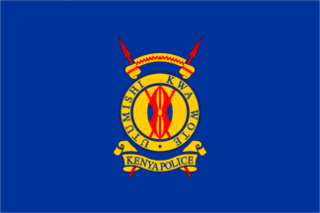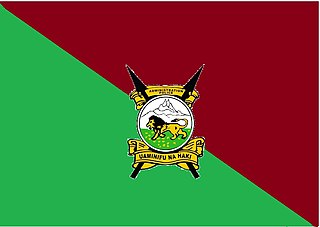Related Research Articles

Daniel Toroitich arap Moi was a Kenyan politician who served as the second president of Kenya from 1978 to 2002. He is the country's longest-serving president to date. Moi previously served as the third vice president of Kenya from 1967 to 1978 under President Jomo Kenyatta, becoming the president following the latter's death.

Nakuru is a city in the Rift Valley region of Kenya. It is the capital of Nakuru County, and is the third largest urban area in Kenya. As of 2019, Nakuru has an urban population of 570,674, making it the largest urban centre in the Rift Valley, succeeding Eldoret, Uasin Gishu County. The city lies along the Nairobi–Nakuru Highway, 160 kilometres (99 mi) from Nairobi.

Nyahururu is a town in Kenya, lying north east of Nakuru. The town derives its name from the Maasai word e-naiwurruwurr, meaning waterfall and/or windy or place of storms. It is allegedly located in Laikipia County. Despite this, Nyahururu formerly functioned as the administrative capital of Nyandarua District, before it became a county, until the headquarters was shifted to Ol Kalou. There have been calls for a reversal. The town has an urban population of 36,450. The town still continues to be a central economic power of the immediate former district of Nyandarua. For that reason, the town has strong economic ties to the two counties.

Nakuru County is a county in Kenya. It is county number 32 out of the 47 Kenyan counties. Nakuru County is a host to Kenya's Fourth City – Nakuru City. On 1 December 2021, President Uhuru Kenyatta awarded a City Charter status to Nakuru, ranking it with Nairobi, Mombasa, and Kisumu as the cities in Kenya. With a population of 2,162,202, it is the third most populous county in Kenya after Nairobi County and Kiambu County, in that order. With an area of 7,496.5 km2, it is Kenya's 19th largest county in size. Until 21 August 2010, it formed part of Rift Valley Province.
The Orange Democratic Movement (ODM) is a centre-left political party in Kenya. It is the successor of a grassroots people's movement that was formed during the 2005 Kenyan constitutional referendum campaign. This movement separated in August 2007 into the Orange Democratic Movement Party of Kenya and the Wiper Democratic Movement – Kenya.

The Kenya Police Service is a national body in charge of law enforcement in Kenya. It is subordinate to National Police Service which is headed by Inspector General of Police who exercises independent command over the Service. Kenya Police is headed by Deputy Inspector General. Kenya Police is divided into Service Headquarters in Nairobi, Formations, General Duty Commands and Training Institutions.

The Administration Police Service (APS) is a paramilitary security organization and is a branch of the Republic of Kenya's National Police Service.
General elections were held in Kenya on 27 December 2007. Voters elected the President, and members of the National Assembly. They coincided with the 2007 Kenyan local elections.
The 2007–2008 Kenyan crisis was a violent political, economic, and humanitarian crisis that erupted in Kenya after former President Mwai Kibaki was declared the winner of the presidential election held on December 27, 2007. Supporters of Kibaki's main opponent in that election, Raila Odinga of the Orange Democratic Movement, alleged electoral manipulation. This position was widely confirmed by international observers, as being perpetrated by both parties in the election. Even the head of the electoral commission himself confirmed that he did not know who had won the elections despite announcing the incumbent as president.
David Musila is a Kenyan politician. He belongs to the Wiper Democratic Movement and was elected to represent Mwingi South Constituency in the National Assembly of Kenya in the Kenyan parliamentary election of 1997. In 2013 he was elected as the first senator representing Kitui County.
The Waki Commission, officially The Commission of Inquiry on Post Election Violence (CIPEV), was an international commission of inquiry established by the Government of Kenya in February 2008 to investigate the clashes in Kenya following the disputed Kenyan presidential election of 2007.
A list of happenings in 2009 in Kenya:

The International Criminal Court investigation in Kenya or the situation in the Republic of Kenya was an investigation by the International Criminal Court (ICC) into the responsibility for the 2007–2008 post-election violence in Kenya. The 2007–2008 crisis followed the presidential election that was held on 27 December 2007. The Electoral Commission of Kenya officially declared that the incumbent President Mwai Kibaki was re-elected however supporters of the opposition candidate Raila Odinga accused the government of electoral fraud and rejected the results. A series of protests and demonstrations followed, and fighting—mainly along tribal lines—led to an estimated 1,200 deaths and more than 500,000 people becoming internally displaced.
Kenya's Truth, Justice and Reconciliation Commission (TJRC) was established in 2008. Kenya's modern history has been marked not only by liberation struggles but also by ethnic conflicts, semi-despotic regimes, marginalization and political violence, including the 1982 attempted coup d'état, the Shifta War, and the 2007 post-election violence.

The Independent Electoral and Boundaries Commission (IEBC) is an independent regulatory agency that was founded in the year 2011 through the making of the Constitution of Kenya. The Commission is responsible for conducting or supervising referendums and elections to any elective body or office established by the Constitution, and any other elections as prescribed by an Act of Parliament. It was created in a provision of the 2010 constitution and the Independent Electoral and Boundaries Commission Act. Its mandate includes "the continuous registration of voters and revision of the voter's roll, the delimitation of constituencies and wards, the regulation of political parties process, the settlement of electoral disputes, the registration of candidates for elections, voter education, the facilitation of the observation, monitoring and evaluation of elections, the regulation of money spent by a candidate or party in respect of any election, the development of a code of conduct for candidates and parties, [and] the monitoring of compliance with legislation on nomination of candidates by parties."

The Ethics and Anti-Corruption Commission (EACC) formerly the Kenya Anti-Corruption Commission(KACC) is a public body established under Section 3 (1) of the Ethics and Anti-Corruption Commission Act, 2011.The Commission is mandated to combat and prevent corruption through law enforcement, preventive measures, education and promotion of standards and best practices in integrity and ethics in Kenya

Sub-counties, also known as Districts, are the decentralised units through which government of Kenya provides functions and services. At national level, sub-counties take a more administrative function like security, statistical purposes, provision of government services, etc. Even though the sub-counties are divisions of counties, powers to create new national sub-counties lies with the national government. As of 2023, there are 314 sub-counties, compared to 290 constituencies. A deputy county commissioner is appointed by the state to lead each sub-county. The sub-counties are further divided into divisions, locations and sub-locations.
David Mwole Kimaiyo is a Kenyan police officer. He was the first Inspector General of the Kenya Police, a position created by the 2010 Kenyan Constitution to replace the position of Police commissioner. He was the first Kenya head of police whose appointment required approval by parliament.
The Nakuru County Peace Accord refers to the peace agreement signed on 19 August 2012 between elders of the Agikuyu and Kalenjin communities as well as other ethnic groups of Kenya.
References
- ↑ "Investigate trail of bogus officer, Kibaki orders". Archived from the original on 2013-01-07. Retrieved 2013-01-07.
- ↑ "Joshua Waiganjo, Kenyan 'fake policeman', charged". January 4, 2013 – via www.bbc.co.uk.
- ↑ "Kibaki orders probe into activities of police 'impersonator' » Capital News". January 5, 2013.
- 1 2 "Police headcount ordered as three top officers suspended - News - nation.co.ke". Archived from the original on 2013-01-09. Retrieved 2013-01-09.
- 1 2 3 "Public hearings to be held in imposter saga". Capital FM. 15 January 2013. Retrieved 15 January 2013.
- 1 2 "'POLICE BOSSES HELPED FAKE NAKURU COP' | the Star". Archived from the original on 2013-02-18. Retrieved 2013-01-07.
- ↑ "Waiganjo tells of past 'sensitive' discussions". Daily Nation. 30 January 2013. Retrieved 2 February 2013.
- ↑ "Raila agrees to meet 'fake' cop". Capital FM. 30 January 2013. Retrieved 2 February 2013.
- ↑ Kaberia, Judie (January 5, 2013). "Police say Naivasha 'fake' officer is a reservist » Capital News".
- ↑ Burrows, Olive (January 8, 2013). "3 top cops suspended over imposter saga » Capital News".
- 1 2 "Waiganjo Hearing Moves To Nairobi". Citizen Media. 24 January 2013. Archived from the original on 21 February 2013. Retrieved 29 January 2013.
- ↑ "Iteere denies role in police impostor saga". Daily Nation. 26 January 2013. Retrieved 29 January 2013.
- 1 2 3 4 "Waiganjo's probe team wants Mbijiwe, Ngugi sacked". The Standard. 31 January 2013. Retrieved 2 February 2013.
- 1 2 "Waiganjo probe recommends sacking of top officers". Daily Nation. 31 January 2013. Retrieved 2 February 2013.
- ↑ "WAIGANJO DECISION A 'COVER - UP'". The Star. 1 February 2013. Archived from the original on 4 February 2013. Retrieved 2 February 2013.